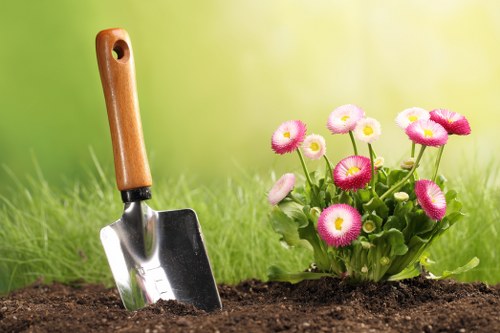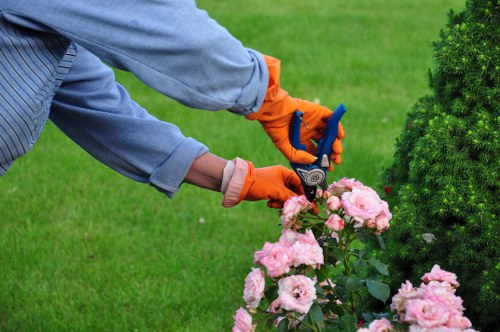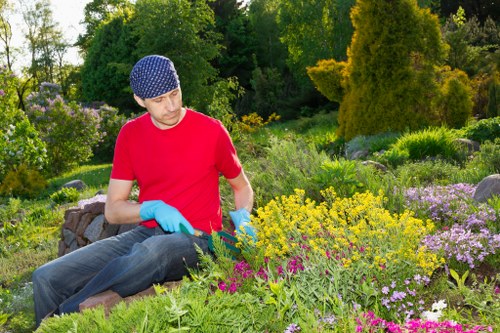Comprehensive Guide to Garden Maintenance in Kensington
Introduction to Garden Maintenance

Maintaining a beautiful garden in Kensington requires dedication, knowledge, and the right tools. Whether you're a seasoned gardener or a beginner, understanding the essentials of garden maintenance can transform your outdoor space into a lush, thriving oasis.
Garden maintenance encompasses a variety of tasks, from regular watering and weeding to more intensive activities like pruning, fertilizing, and pest control. Each element plays a crucial role in ensuring the health and aesthetics of your garden.
In this article, we will explore the best practices for garden maintenance in Kensington, considering the local climate, soil conditions, and plant varieties that thrive in this region.
Understanding Kensington's Climate

Kensington experiences a temperate climate, characterized by mild winters and warm summers. This climate is conducive to a wide range of plants, but it also presents specific challenges that gardeners must address.
The average rainfall in Kensington is evenly distributed throughout the year, reducing the risk of drought but increasing the potential for fungal diseases. Proper garden maintenance strategies are essential to mitigate these risks and promote plant health.
Additionally, Kensington's soil composition varies, with areas of clay, silt, and loam. Understanding your garden's soil type is crucial for selecting appropriate plants and amendments that will thrive in your specific conditions.
Essential Garden Maintenance Tasks

Regular garden maintenance involves a series of tasks that keep your garden in optimal condition. Here are the essential activities every Kensington garden owner should perform:
- Watering: Ensure plants receive adequate water, adjusting for seasonal changes and rainfall.
- Weeding: Remove unwanted plants to reduce competition for nutrients and water.
- Pruning: Trim dead or overgrown branches to encourage healthy growth and improve plant shape.
- Fertilizing: Apply appropriate fertilizers to supply essential nutrients based on soil tests.
- Pest Control: Monitor for pests and diseases, using eco-friendly solutions when possible.
Seasonal Garden Maintenance

Each season presents unique opportunities and challenges for garden maintenance. Tailoring your approach to the time of year ensures that your garden remains healthy and vibrant throughout the year.
Spring Maintenance
Spring is a critical time for garden preparation. Key tasks include:
- Soil Preparation: Test and amend soil pH and nutrient levels.
- Planting: Sow seeds and transplant young plants.
- Pruning: Remove dead branches from trees and shrubs.
Summer Maintenance
During the warmer months, focus on:
- Watering: Maintain consistent moisture levels, especially during dry spells.
- Mulching: Apply mulch to conserve moisture and suppress weeds.
- Pest Management: Keep an eye out for pests and treat them promptly.
Choosing the Right Plants for Kensington

Selecting plants that are well-suited to Kensington's climate and soil conditions can significantly ease garden maintenance efforts. Consider the following factors when choosing your garden plants:
- Hardiness: Ensure plants can withstand local temperature ranges.
- Soil Requirements: Match plant needs with your garden's soil type.
- Water Needs: Choose plants that align with your watering capacity and rainfall patterns.
- Sunlight Exposure: Position plants according to their sunlight preferences.
Some popular plants in Kensington gardens include roses, lavender, hydrangeas, and native grasses, all of which thrive under the local conditions with proper care.
Soil Management and Fertilization
Soil Testing and Amending
Understanding your garden's soil composition is the foundation of effective garden maintenance. Regular soil testing can reveal nutrient deficiencies and pH imbalances that need correction.
Based on soil test results, incorporate organic matter like compost or well-rotted manure to enhance soil structure and fertility. Adding lime or sulfur can adjust pH levels to suit specific plant requirements.
Organic vs. Synthetic Fertilizers
When choosing fertilizers, consider the benefits of organic options, which improve soil health over time, versus synthetic fertilizers that provide immediate nutrient availability. A balanced approach often yields the best results for a sustainable garden.
Watering Strategies for Optimal Growth
Proper watering is critical for plant health, especially in a climate like Kensington's. Implementing the right watering strategies can prevent common issues such as overwatering, underwatering, and root diseases.
- Deep Watering: Encourage deep root growth by watering thoroughly and infrequently.
- Early Morning: Water in the morning to reduce evaporation and allow plants to absorb moisture before the heat of the day.
- Drip Irrigation: Use drip systems to deliver water directly to the plant roots, minimizing waste.
Monitoring soil moisture levels helps adjust watering schedules based on weather conditions and plant needs, ensuring a balanced water supply throughout the growing season.
Pest and Disease Management
Protecting your garden from pests and diseases is a cornerstone of effective garden maintenance. Implementing integrated pest management (IPM) strategies can help control issues organically and sustainably.
Identifying Common Pests
Kensington gardens may encounter pests such as aphids, slugs, and caterpillars. Regularly inspect plants for signs of infestation and take action at the first indication of trouble.
Natural Remedies
Utilize natural remedies like neem oil, insecticidal soap, and beneficial insects to manage pest populations without harming the environment.
Preventative Measures
Maintain garden hygiene by removing debris and dead plant material, which can harbor pests and diseases. Rotating crops and planting resistant varieties also reduce susceptibility to common issues.
Pruning and Trimming Techniques
Regular pruning and trimming are essential for maintaining plant health and encouraging robust growth. Proper techniques vary depending on the plant type and desired outcomes.
- Deadheading: Remove faded flowers to promote new blooms and prevent seed formation.
- Shape Pruning: Trim branches to maintain the desired shape and size of shrubs and trees.
- Thinning: Remove excess branches to improve air circulation and light penetration.
Using sharp, clean tools ensures clean cuts that heal quickly, reducing the risk of disease transmission and promoting overall plant vitality.
Mulching for Garden Health
Mulching is a beneficial practice that supports garden maintenance by conserving moisture, suppressing weeds, and regulating soil temperature. Different types of mulch offer various advantages:
- Organic Mulch: Includes materials like bark, straw, and compost, which enrich the soil as they decompose.
- Inorganic Mulch: Comprises materials such as gravel or plastic, which are longer-lasting but do not improve soil fertility.
- Color Mulch: Available in various colors to enhance the visual appeal of the garden.
Applying a layer of mulch around plants reduces evaporation, minimizes weed growth, and creates a polished, well-maintained appearance for your Kensington garden.
Lawn Care and Maintenance
A well-maintained lawn is a centerpiece of any garden. Proper lawn care in Kensington involves mowing, fertilizing, aerating, and pest control to keep the grass healthy and vibrant.
Choosing the Right Grass Type
Select grass varieties that are suited to Kensington's climate and soil. Popular choices include perennial ryegrass, fescues, and Kentucky bluegrass, each offering different levels of drought resistance and maintenance requirements.
Mowing Practices
Mow the lawn regularly, maintaining a height that promotes dense growth and reduces weed infiltration. Avoid cutting more than one-third of the grass blade at a time to prevent stress.
Fertilization and Aeration
Apply fertilizers based on soil test recommendations to supply necessary nutrients. Aerate the lawn annually to alleviate soil compaction and enhance root development.
Garden Tools and Equipment
Having the right tools and equipment is essential for efficient garden maintenance. Invest in high-quality tools that are comfortable to use and suited to your specific gardening tasks.
- Hand Tools: Includes trowels, pruners, and weeders for precise and small-scale tasks.
- Power Tools: Such as lawnmowers, trimmers, and leaf blowers for larger maintenance activities.
- Storage Solutions: Keep tools organized and protected from the elements with proper storage options.
Regularly maintain your garden tools by cleaning, sharpening, and storing them properly to extend their lifespan and ensure optimal performance.
Sustainable Garden Practices
Adopting sustainable practices in garden maintenance not only benefits the environment but also enhances the resilience and beauty of your garden. Here are some strategies to implement sustainability in your Kensington garden:
- Composting: Recycle organic waste into nutrient-rich compost to improve soil health.
- Rainwater Harvesting: Collect and use rainwater for irrigation, reducing reliance on municipal water sources.
- Native Plants: Incorporate native species that require less water and are more resistant to local pests.
By integrating these sustainable methods, you contribute to a healthier ecosystem while enjoying a flourishing garden.
Hiring Professional Garden Maintenance Services
While DIY garden maintenance is rewarding, hiring professional services can ensure thorough and expert care, especially for large or complex gardens. Professional gardeners bring expertise, advanced tools, and efficient techniques to maintain your garden's beauty and health.
Benefits of Professional Services
- Expert Knowledge: Professionals understand plant biology, soil science, and pest management.
- Time Savings: Outsourcing maintenance frees up your time for other pursuits.
- Consistent Care: Regular, scheduled maintenance ensures ongoing garden health.
If you're considering professional garden maintenance in Kensington, research local providers, check references, and discuss your specific needs to find the best match for your garden.
Conclusion
Effective garden maintenance in Kensington combines knowledge of local climate and soil conditions with regular care and sustainable practices. By following the strategies outlined in this article, you can create and maintain a vibrant, healthy garden that enhances your outdoor living space.
Whether you choose to maintain your garden yourself or enlist the help of professionals, the key to success lies in consistent effort, informed decision-making, and a passion for nurturing your green space.
Contact us today to learn more about our garden maintenance services and how we can help transform your Kensington garden into a stunning showcase of nature's beauty.

